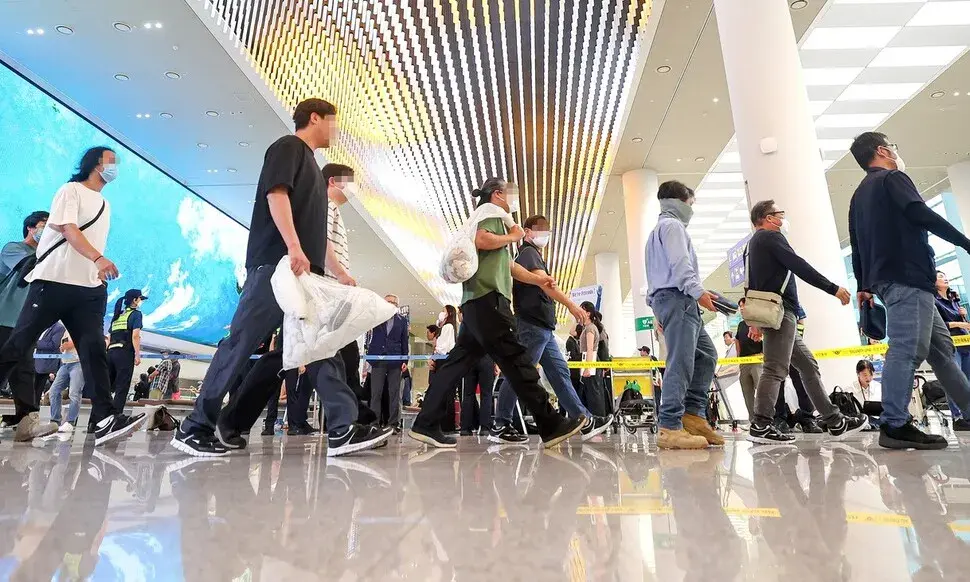South Korean workers who were detained and released by U.S. immigration authorities entered the country via Incheon International Airport on the 12th. Co-authored photography
MAGA is a crime against everyone’s humanity. They’re making you complicit by reading and doing nothing. This is a terrible regime of criminals all the way up and down.
Machine translation
“Only a Piece of Cloth in the Bathroom, Couldn’t Even Protest…What Did We Do Wrong?”
‘Human Rights Violations’ as Told by Detained Workers
By Cho Hae-young, Jang Jong-woo, Seo Young-ji, Lee Seung-wook
Modified 2025-09-14 22:16, Published 2025-09-14 18:39
With their waists and hands bound together, they had to bow their heads and lap up water to drink. In the bathroom without partitions, there was only a single piece of cloth to cover their lower body. Barely any sunlight came through the fist-sized holes, and they were only allowed to go out to a small yard for just two hours. The workers and their families, who were detained by U.S. immigration authorities for eight days, expressed shock as they recounted unimaginable human rights violations and absurdities they never could have imagined experiencing as ordinary Korean citizens in 2025.
As 330 workers who had been detained during an illegal immigration crackdown at the Hyundai-LG Energy Solution joint battery factory in Georgia returned on the 12th, accounts of human rights violations experienced during detention have been emerging one after another. According to their testimonies on the 14th, the detention facilities completely failed to meet the United Nations Standard Minimum Rules for the Treatment of Prisoners (the Nelson Mandela Rules) in areas including hygiene, external communication, the right to appeal, and situation explanations.
The arrest process itself was absurd. Without even basic explanations such as reading Miranda rights, no one could properly understand the situation. Mr. Seo, a 40-something employee of an LG Energy Solution partner company, said, “I didn’t even know I was being arrested. I thought it was just an identity verification procedure, but then they told me to sign some documents.” The family of another partner company employee, Mr. G (48), said, “They noticed the word ‘arrest’ on the documents and whispered that they probably shouldn’t sign it, but since the agents were carrying guns, they ended up signing anyway.” Immigration and Customs Enforcement (ICE) agents collected personal items like cell phones in “onion net” bags, then bound the workers’ arms and legs with chains, and when those ran out, they used cable ties to restrain the workers.
Workers were initially packed into temporary facilities housing 72 people per room. According to a worker’s detention diary reported by Yonhap News that day, bunk beds were lined up, and the mattresses were moldy. Basic items like toothpaste, toothbrushes, and blankets were only provided on the second day of detention. Workers wrapped themselves in towels to ward off the cold. The water had an odor, so many workers only moistened their lips with it, and throughout the detention period, they were only provided with canned beans and toast as food.
On the 3rd to 4th day of detention, workers were gradually assigned to two-person cells. These were about 4.96 square meters (1.5 pyeong) in size with bunk beds and a metal desk. The biggest problem was the bathroom. In the shared space, the toilet was “open” with only a single piece of cloth to cover the lower body. Partner company worker Cho Young-hee (44) said, “Human rights were particularly not guaranteed when it came to bodily functions. It was impossible to use the open bathroom.” For the workers, going out to the “yard” for two hours a day was the only time they could see sunlight. The yard was a narrow courtyard about half the size of a basketball court.
Mr. G conveyed his feelings at the time to Hankyoreh through his family, expressing that the sense of helplessness was overwhelming - being unable to even protest against incomprehensible treatment. Mr. G’s family said, “He said that in a situation where he couldn’t understand what he had done so wrong to deserve such inhumane imprisonment, the reality that no one apologized deeply affected him.” Even when South Korean consular officials visited the detainees, workers’ complaints continued: “What did we do wrong? Shouldn’t this be thoroughly investigated to the end?” The unexpected situation they encountered at a construction site they had gone to build at the request of U.S. investment only heightened their fear. Lee Seong-hoon, Vice President of the Korean Human Rights Association (adjunct professor at Sungkonghoe University’s Graduate School of Civic Peace), said, “Looking at the testimonies so far regarding the arrest process, forcibly confining dozens of people in one room, and providing poor bathroom facilities and food, there appear to be several aspects that don’t meet international standards for the treatment of detainees. While the U.S. tends not to pay much attention to such matters, from our perspective, it’s possible to raise issues from a human rights dimension.”
The Ministry of Foreign Affairs stated, “From the early stages of the incident, the government has continuously expressed regret to the U.S. side and raised the point that our citizens’ rights and interests should not be unfairly violated during the law enforcement process. While some of our requests were accepted and improved, such as limited external phone calls and health checks by medical staff stationed at detention facilities, we will closely examine together with the relevant companies whether there were any inadequate aspects, and whether there were any unfair violations of our citizens’ human rights or other interests, and take necessary measures.”
Cho Hae-young Reporter hycho@hani.co.kr, Jang Jong-woo Reporter whddn3871@hani.co.kr, Lee Seung-wook Reporter eugwookl@hani.co.kr, Seo Young-ji Reporter yj@hani.co.kr
international law
Oh that thing that’s only enforced by half of the world but they never follow it themselves?




